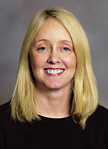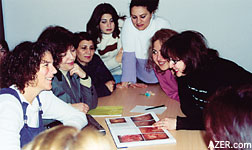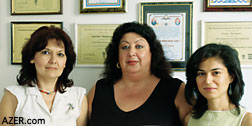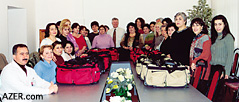|

Autumn 2005 (13.3)
Pages
78-79
Family Medicine
New Approaches Through Partnerships
by
Meg Hayes
  They
say: "Before any journey begins, you own it. But once you
take that first step, the journey owns you." This certainly
has been true in the partnership between the Oregon Health &
Science University (OHSU) Department of Family Medicine in Portland,
where I am a faculty member, and the Narimanov Health District
of Baku, Azerbaijan. They
say: "Before any journey begins, you own it. But once you
take that first step, the journey owns you." This certainly
has been true in the partnership between the Oregon Health &
Science University (OHSU) Department of Family Medicine in Portland,
where I am a faculty member, and the Narimanov Health District
of Baku, Azerbaijan.
Photo: Meg Hayes.
For me, the journey started in Portland in December 2000. It
was a cold Saturday morning and I had hoped for the rare chance
to sleep in late. But, on short notice, I had suddenly been asked
to give a lecture about Family Medicine to a group of Azerbaijani
physicians visiting our university. I agreed, never dreaming
that a month later I would find myself in Baku.
The invitation to travel to
Azerbaijan's capital was a delightful surprise. I imagined gazing
out over the Caspian Sea, eating caviar, shopping for carpets,
learning about a new culture, and then returning home with fascinating
stories. Little did I imagine that five years later I would be
spending my free time looking for financial resources to continue
what has become an important collaboration that has captured
the hearts and minds of medical professionals on opposite ends
of the earth.
Narimanov Partnership
This partnership, funded through the U.S. Agency for International
Development (USAID) and administrated through American International
Health Alliance (AIHA), was charged with the development of a
comprehensive, community-based, primary care system designed
to meet the basic health care needs and improve the health status
of Internally Displaced Persons (IDPs) and refugees in the Narimanov
Health District. The Narimanov District, one of 11 health districts
in Baku, is home to 12 percent of Azerbaijan's refugee and IDP
population, estimated to be 26,000 in the district. This is the
highest concentration of IDPs and refugees among the eleven districts.
The majority of refugees remain concentrated in temporary housing,
many lacking adequate nutrition, reliable supplies of electricity
and water, and sanitary facilities.
The goal of developing such a health-care system was a tall order.
Indeed, it was impossible to fulfill, but everyone approached
each problem and issue optimistically, committed to move forward,
refusing to allow our vision or enthusiasm be realization that
the funding was limited to only three years. We set our sites
high, which enabled us to succeed to a greater degree than might
otherwise have been possible.
The first challenge we faced as partners was to develop a knowledge
and working trust of each other against the back drop of substantial
differences in cultural, social, language as well as medical
practices. But we were all bound by our common love for our patients
and profession, intellectual curiosity, and a strong desire to
improve the health among the people we served.
Family Medicine
The partnership consisted of a series of exchange visits between
medical professionals in Baku and Portland. When the Baku partners
visited us in Portland, they had an opportunity to experience
first hand what the concept of Family Medicine could mean. It
was a new concept for them. We defined it as the ability of physicians
to provide outstanding health care to a population of patients:
men, women and children, from birth to death, in a therapeutic
relationship, based on continuity of care and within the framework
of an understanding of the social and family dynamics affecting
that patient. This was a powerful concept for our Baku partners
in terms of the ramifications for their health system, skills
enhancement, and teamwork with nursing personnel and community
educators.
The results of our three-year Partnership have strengthened the
health care system in Azerbaijan. At the end of our Partnership,
in May 2004, the Azerbaijani Partners opened the doors to the
Primary Health Care Center (PHC) located in a remodeled wing
of the Narimanov Health District Polyclinic No. 4. Today, the
PHC has a professional staff of five Family Physicians and five
nurses; all of them are well equipped to provide high-quality
care to patients of all ages.
The Partnership work has not been limited to the facilities infrastructure,
but includes significant attention to clinical issues such as:
maintaining medical records, organizing patient flow, enhancing
physician-nurse team relationships and community out-reach. The
PHC includes space for clinical examinations and the Community
Health Education and Resource Center, a patient education facility
with books, audiovisual equipment and other learning aids.
  Women's Wellness Center Women's Wellness Center
PHC Director, Dr. Saida Nasibova initiated a program for the
early recognition of breast cancer. Since then, the Center has
examined and trained 40,000 women in breast self-examination.
Left: Dr. Wendy Warren, of Klamath Falls,
Oregon, giving training on colposcopy and Pap smears.
The Partnership provided
ultrasound equipment, which is utilized for diagnostic examination.
Through this clinical work, breast abnormalities have been detected
in 895 patients, who were then referred to the National Oncology
Center for treatment. These are now receiving follow-up care
and psychological support at the PHC. Since 2004, about 300 women
have been screened for cervical cancer. Dr. Elza Bayramova provides
gynecological services including Pap Smear and Colposcopy diagnosis.
In the past year, five percent of women who were screened were
diagnosed with cervical intraepithelial neoplasia and have undergone
appropriate treatment.
Mental Health Services
Nearly 90 percent of the refugee and IDP population treated at
the clinic have been diagnosed with psychological disorders including
post traumatic stress disorder and depression. Through the Partnership,
physicians have been trained in pharmaceutical and behavioral
interventions to assist patients.
The Partnership has attracted the involvement of a neurologist
and psychiatrist, both of whom have traveled to Portland to meet
with physicians of the Intercultural Psychiatric Clinic at OHSU
and develop treatment guidelines for their patients. The Partnership
also trained physicians in the physiology of stress and methods
that can be used to educate patients in self-regulation of escalating
stress and anxiety. The ability to decrease physiological stress
impacts a number of disease processes including cardiovascular
disease and diabetes, which are prevalent in the population.
Adolescent Health
Program
Dr. Tarana Ahmadova's passion for adolescent health care was
sparked during her visit to Portland where she learned about
health clinics that provide information, education, peer counseling,
hot lines and medical care in the areas of substance abuse, risky
sexual practices, contraception, violence, and mental health
issues. The establishment of the Adolescent Health Care Service
has been carried out in cooperation with the United Methodist
Committee Relief (UMCOR).
Within just one year, the District's teen population has demonstrated
a strong interest in these services. The program is now positioned
to open its own Telephone Hot Line to be staffed by student volunteers,
who are trained by the Adolescent Health Center, crisis management
and peer counseling. The students will staff the hot line during
the first two months, paired with experienced specialists. Afterwards,
they will work independently as peer counselors.
  Bronchial Asthma Bronchial Asthma
Reactive Airway Disease and Asthma are leading causes of illness
in the Narimanov District due to living conditions and exposure
to situations that trigger and promote inflammation of the airway.
A partnership initiative to provide patient education and peak
flow meters to monitor status and provide early warning of exacerbation
has allowed patients to manage their illnesses themselves to
a large degree and act early to avoid an exacerbation. Programs
to assist people to stop smoking is a critical component of this
work.
Above, left
to right: Dr. Saida Nasibova
(Director, Primary Health Center) who initiated the program for
early recognition of breast cancer; Dr. Saadat Mahmudova, promoted
to National Coordinator for Development of Family Medicine; and
Dr. Tarana Ahmadova, Adolescent Health Specialist. They were
the major Azerbaijani coordinators for the Baku-Oregon Family
Health Medical Program.
Home Visits
The visiting physician/nurse program is one of the unique features
of the Narimanov program. The District is divided into 30 distinct
areas, with a visiting physician-nurse team assigned to each
area. Each team is responsible for approximately 3,680 people.
The teams spend each morning working in their home clinic, and
then visit patients in their homes in the afternoons.
  Medical Bag Project Medical Bag Project
A key component of the Partnership was to enrich the home visit
program through skills enhancement, physician-nurse team building
and the use of a Mobile Clinic by providing medical bags equipped
with all the essential diagnostic tools of a medical exam room.
Above: Graduation Ceremony
for Medical Bag Training. Equipping medical bags with essential
diagnostic tools of a medical exam room enabled the physicians
and nurses to strengthen the Mobile Clinic. In the center are
Stephen Kliewer and Saadat Mahmudova, program coordinators from
Baku and Portland, Oregon. Through this initiative 92 percent
of the refugees living in the Narimanov District in Baku were
examined. Illness was diagnosed in 83 percent of the patients,
many of whom were able to receive additional treatment at medical
centers.
Skills enhancement sessions
were held to train the District's physicians and nurses in the
use of all the equipment, basic physical examination skills,
and psychological counseling.
Through this initiative 92 percent
of the Narimanov District IDP and refugee population were examined.
Illness was diagnosed in some 83 percent of the patients and
46 percent were referred to a medical center for additional evaluation,
while the remaining patients were able to be treated and receive
medication and counseling via home visits. The Medical Bag Project
gave the partnership physicians an impressive visibility in the
community. Appearing on the streets with well-equipped, recognizable
medical bags strengthened the confidence of physicians. Patients
in need of care welcomed this extension of medical services.
Family Medicine
- New Specialty
In 2002, the Minister of Health appointed Narimanov Health District
Director, Dr. Saadat Mahmudova, as the National Coordinator for
the Development of Family Medicine. A working group was established
to begin training Family Physicians. Dr. Mahmudova is responsible
for developing the strategy to introduce the concept of Family
Medicine into the current health system in Azerbaijan. The working
group assists the Minister of Health in fundraising to support
the initiative, develop training and residency programs for clinicians
and establish a network of Family Medicine clinics. In this short
period of three years, they have succeeded in accomplishing the
following projects.
1. Establishing a Chair of Family Medicine at the State
Medical University (2003) for the continuation of training of
medical personnel.
2. Offering a three-month course in Family Medicine at
the Medical Advanced Training Institute (2004).
3. Certifying 10 physicians in Family Medicine.
4. Establishing a partnership between physicians in the
city of Ganja with Family Medicine physicians from California.
5. Opening the first Family Medicine Clinic.
6. Developing consultant relationships between specialists
from scientific research institutes and the Family Medicine Clinic.
The Baku Partners are a group of health care professionals with
a proven track record, demonstrating that they know how to make
a true difference in the health of a nation by virtue of their
accomplishments in the Narimanov District. Azerbaijan deserves
to have their collective skills recognized and continued in order
to build a primary care system that will address the need for
cost-effective, high quality health care.
The commitment to establish an academic presence will be important
in training physicians capable of bringing this promise to reality
throughout the country, not just in Baku. In the United States,
the key factors in the training of family physicians have been
the support of national and local governments, the development
of organizations capable of providing oversight of the training
requirements and certification, and professional specialty societies
for continued medical education and representation of its members.
Azerbaijan Family Medicine physicians and their clinics need
international support, a critical component for ensuring their
success over time. Although the Portland-Baku Partnership has
not received any funding since May 2005, the program is still
supported - on a small scale - through individuals and organizations.
For example, the Rotary Club of Klamath Falls, Oregon, has raised
money to support a Diabetes Initiative in the Primary Health
Care Center. Diagnostic supplies, medications, patient education,
and chronic disease management components will be implemented
under the direction of Dr. Gulchin Gadimova who visited Klamath
Falls during a partnership visit to Oregon. As I look back over
this journey that unites people who live 8,000 miles distant
from each other, I realize that my life has changed during these
past four years because of my association with the Baku Partners.
The experience has enriched my life immensely. I've become a
better doctor, mentor and teacher because of this relationship.
My deepest wish is to be able to bring this project and collaboration
to the attention of others, who will, in turn, be inspired and
join in the effort by contributing resources to help this seed
grow and bear real fruit in strengthening the health of all the
people of Azerbaijan.
Meg Hayes, MD, is Assistant
Professor of Family Medicine at the Oregon Health & Sciences
University (OHSU), and Medical Director at their Family Medicine
Facility at Marquam Hill. Dr. Hayes has been involved with the
Narimanov Partnership Project in Azerbaijan since late 2000.
Because of the success of the three-year funded program in Azerbaijan,
she is presently seeking ways to help extend and expand the program.
Contact Dr. Meg Hayes: hayesm@ohsu.edu.
Back to Index AI 13.3 (Autumn
2005)
AI Home
| Search | Magazine
Choice
| Topics
| AI Store | Contact us
Other Web sites
created by Azerbaijan International
AZgallery.org | AZERI.org | HAJIBEYOV.com
|




